Key takeaways:
- Root canal treatment, contrary to common misconceptions, is designed to relieve pain and preserve dental health through the removal of infected pulp.
- Maintaining good dental health is crucial for overall well-being, affecting not just oral health but also confidence and social interactions.
- Effective communication, proper preparation, and aftercare play significant roles in managing anxiety and ensuring a smooth recovery post-procedure.
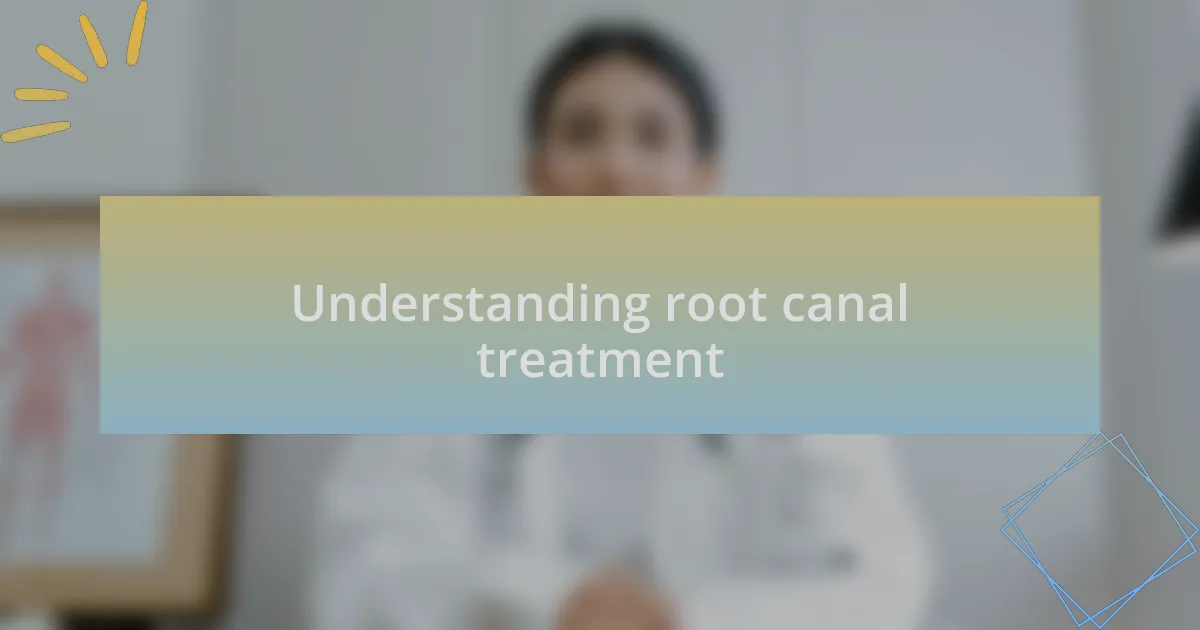
Understanding root canal treatment
Root canal treatment is often misunderstood. Many people envision it as a painful experience, but I can assure you that it’s designed to relieve pain rather than cause it. When I first learned I needed one, I felt a mix of anxiety and uncertainty—questions raced through my mind. Would it be as terrifying as people said?
During the procedure, I experienced firsthand that the use of anesthesia made a significant difference. I barely felt a thing! My dentist explained each step, which eased my nerves. It’s fascinating how this treatment saves a tooth by removing infected pulp and preserving the structure, isn’t it? It made me appreciate how dentistry combines science and care to protect our teeth.
After the treatment, I couldn’t help but feel a weight lifted. The relief from that nagging pain reminded me of just how important dental health is. Root canals really highlight the importance of early intervention—if I had waited longer, who knows what complications I might have faced? Engaging with the process and understanding what happens made a world of difference for me, turning what I thought would be a dreadful experience into a lesson in dental health.
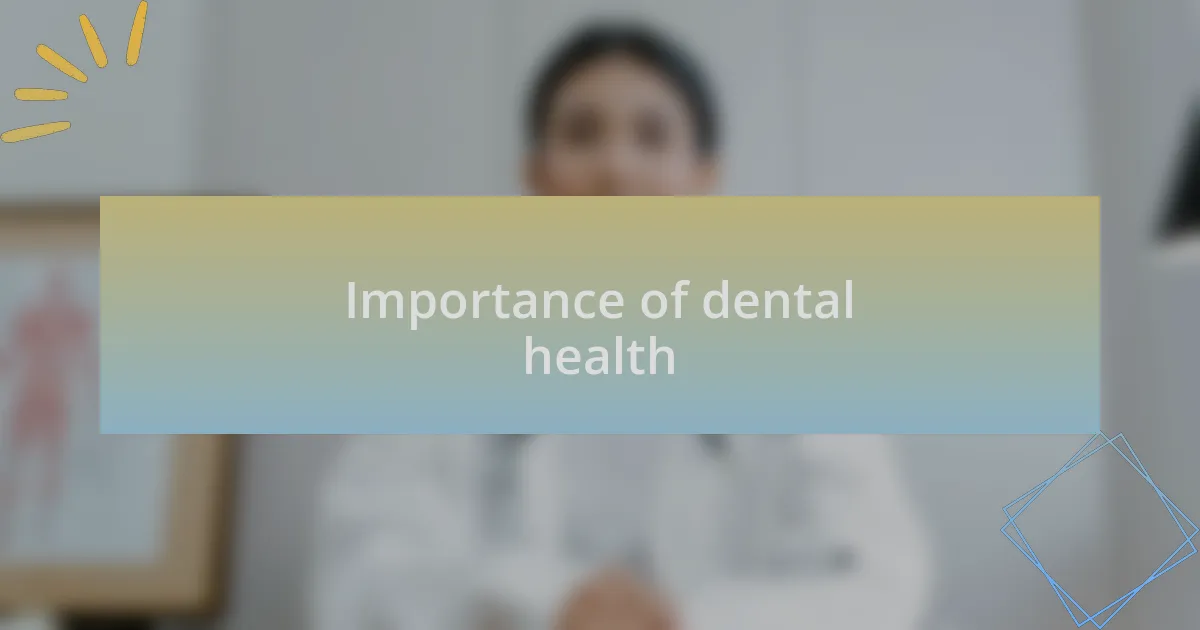
Importance of dental health
Maintaining good dental health is essential for overall well-being. I can still remember a time when I neglected my oral hygiene, thinking it was no big deal. However, that mindset changed when I faced the consequences of not taking care of my teeth, which ultimately led to my root canal experience. It made me realize that our mouths are gateways to our bodies, affecting everything from digestion to heart health—who would have thought that a small tooth could hold such significance?
Regular dental check-ups are crucial. I used to view them as an inconvenience, but now I see them as a lifeline. They’re my opportunity to catch problems early, much like how I caught my need for a root canal just in time. It’s an empowering feeling to know that by prioritizing dental visits, I can prevent bigger issues down the road. Have you ever considered how much easier life could be with a proactive approach to dental care?
Furthermore, good dental health positively impacts our confidence. After my root canal, I felt renewed; not just pain-free, but ready to smile without hesitation. I learned that a healthy mouth can influence one’s self-esteem and social interactions. Imagine missing out on opportunities just because you were afraid to show your teeth—what a shame that would be! Each time I smile now, I’m grateful I took the necessary steps to prioritize my dental health.

Insights from my dental experience
Experiencing a root canal was eye-opening for me. As I sat in the dental chair, I vividly remember my fears melting away as the dental team guided me through every step. I learned that communication plays a crucial role in alleviating anxiety. Have you ever been in a situation that felt daunting, only to realize that understanding what to expect made it easier?
Another insight I gained is the incredible resilience of our bodies. After the procedure, I expected lengthy recovery and discomfort, but I was pleasantly surprised by how quickly I bounced back. It made me appreciate the healing process more deeply. Isn’t it remarkable how our bodies can recover and adapt? This experience has motivated me to be kinder to myself, both physically and mentally.
Lastly, I found that sharing my dental journey with friends sparked conversations about their experiences. It’s amazing how a simple root canal opened the door to discussions about fears, triumphs, and the importance of oral health. I realized that our stories can be powerful tools for connection. Have you ever bonded with someone over a shared experience, discovering strength in vulnerability?
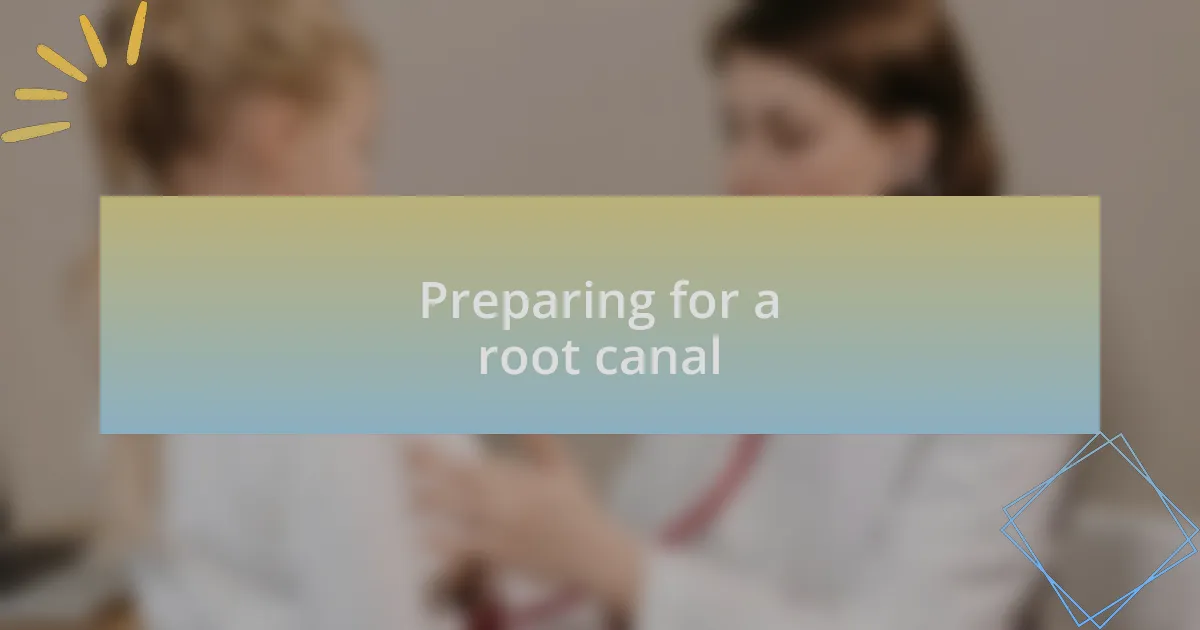
Preparing for a root canal
Preparing for a root canal can feel overwhelming, but I found that having a game plan really helped. Before my appointment, I made sure to gather all pertinent information, like discussing the procedure with my dentist and understanding what sedation options were available. Did you know that simply knowing what to expect can alleviate much of the anxiety?
On the day of my procedure, I chose to take a friend with me for support. That simple decision made a world of difference. Just having someone there to share the experience, even in silence, eased my nerves. It’s funny how a familiar face can turn a daunting situation into something more manageable, don’t you think?
I also prepared mentally by practicing relaxation techniques, such as deep breathing and visualization. I imagined myself in a serene place, free from discomfort. It felt empowering to take an active role in my comfort during such a pivotal moment. Have you ever tried mental visualization in a stressful situation? It can truly transform your outlook.
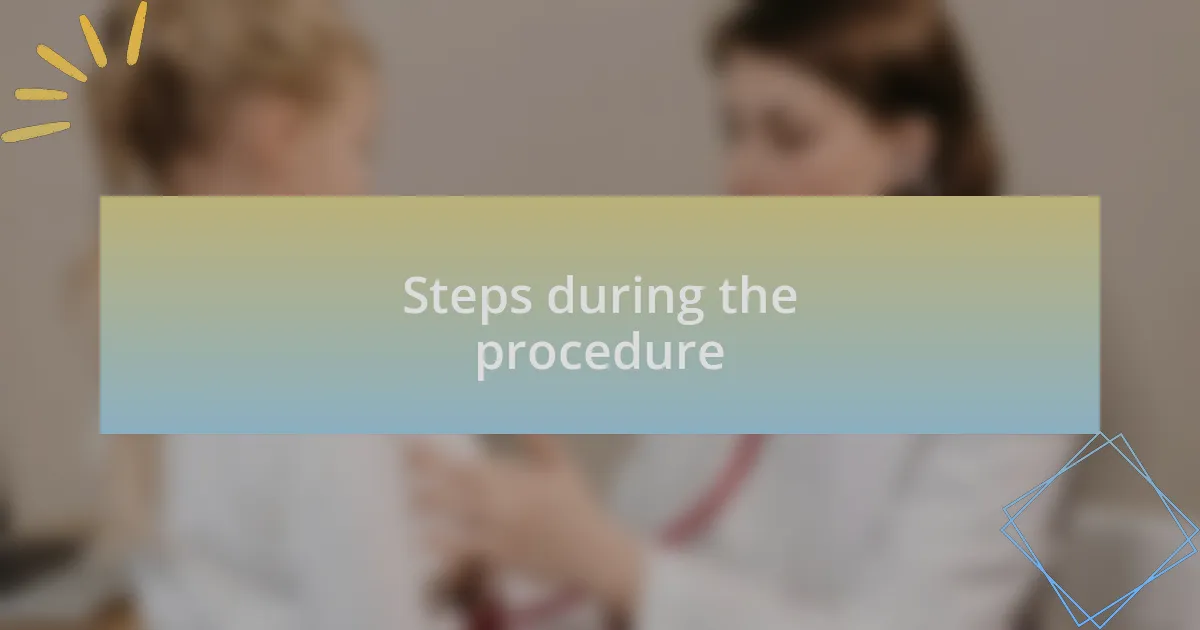
Steps during the procedure
The first step during the root canal procedure involves numbing the area around the affected tooth. I remember the slight sting of the anesthetic injection, but it was worth it to ensure I wouldn’t feel any pain. Once numb, I felt a wave of relief because I knew the dentist could go deeper without causing discomfort.
Next came the drilling, where the dentist carefully accessed the inner chamber of the tooth. As I sat in the chair, I couldn’t help but think about how vital this step was for eliminating any infection. The sound of the drill might seem intimidating, but to me, it symbolized progress—each rotation bringing me closer to relief.
After the dentist removed the infected tissue, the cleaning began. This part was fascinating; I could visualize the process of elimination as my dentist methodically cleared away debris. It felt oddly satisfying to know that they were restoring my tooth to health, and I wondered if others felt the same mix of discomfort and curiosity during their own procedures.
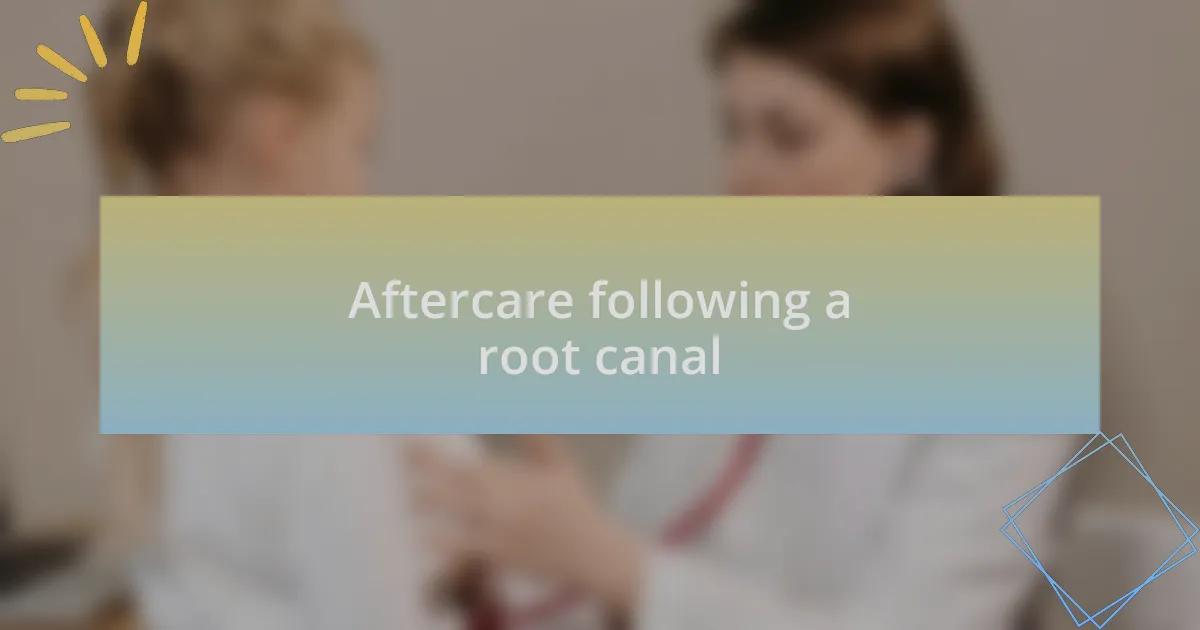
Aftercare following a root canal
After your root canal, following proper aftercare is crucial for a smooth recovery. I remember being surprised by how tender my tooth felt, and the dentist reminded me to avoid hard foods for a few days. It made me think, “Why had I not considered the impact of my diet on healing?” Giving your mouth time to heal truly is essential.
Pain management is another important aspect to think about. I recall taking over-the-counter pain relievers as recommended, and to my relief, it helped curb the discomfort significantly. It’s interesting to see how much a simple pill can make a difference; I often found myself wondering how many others overlook this key step in their own care.
Finally, don’t underestimate the power of good oral hygiene. Just because you’ve had a procedure doesn’t mean you should skip brushing and flossing. In fact, I felt more motivated than ever to keep my mouth clean, thinking, “This is my chance to give my tooth a fresh start!” Regular check-ins with your dentist can also help ensure everything heals properly, reinforcing the commitment to my dental health.

Reflections on my dental journey
Thinking about my dental journey, I realize how much this experience opened my eyes to the importance of proactive care. I distinctly remember sitting in the dental chair, heart racing, and suddenly feeling a mix of anxiety and relief. It was a defining moment that made me ask myself, “How did I let my dental health get to this point?” This reflection spurred me to invest more time in understanding my oral health.
After the procedure, I found myself contemplating the emotional aspect of dental visits. The lingering discomfort was not just physical; it stirred feelings of vulnerability and anxiety. I wondered, “Why do we often neglect our dental health until it becomes a crisis?” Navigating through this process made me appreciate the role that openness and communication with my dentist played in alleviating my fears.
With every follow-up appointment, I noticed a shift in my mindset. I grew increasingly aware of the connection between my dental care and overall well-being. I can’t help but think, “How many people, like me, overlook the broader impacts of their oral health?” Each visit now feels less daunting and more like a partnership in my journey toward better health.